

In his final year at school, Bob studied Mathematics, Physics and Chemistry.
He then went to Cambridge and obtained BA and PhD degrees.
Since graduating with his PhD, Bob has worked in the following places:
Bob and his wife, Eve have two adult daughters. Both girls have degrees from La Trobe; one in humanities and the other in biological science.
For relaxation, Bob enjoys classical music, environmental concerns, tree propogation, general gardening and painting. Bob is one of the most 'computer aware' of the Biochemistry lecturers, using the new technology to produce interesting Power Point based lectures for his students. (He made most of his own diagrams for this page, and you'll see that his skills are way ahead of this Biology teacher's!)
The Scopes name has recently been in the news in relation to the evolution/creation debate and "Noah's Arc". In America, the name is well known for the Tennessee "Scopes Trial" in 1925, when a school teacher named John Scopes was tried (and convicted) for teaching Darwinian evolution.
John Scopes was our Prof Scopes' grandfather's second cousin! Prof Bob Scopes also coincidentally was brought up close to Darwin's home in Downe, Kent, and went to the same college in Cambridge as Darwin had more than 100 years earlier.
Naturally, Bob Scopes does not support creation "science"!
Interviewer: Can you describe briefly how you are doing whatever you do?
Prof Scopes: We isolate the genes responsible for alcohol production, or actually the correct DNA, from an organism which does make ethanol. Then we construct a plasmid vector which contains that DNA. We use the vector to transform the E.coli so that it becomes a transgenic organism capable of ethanol production.
Interviewer: Who or what (animal or plant) will benefit from your research/techniques?
Prof Scopes: The whole of society will benefit from this research. It will become possible to use E.coli to create fuel alcohol which will address the problems associated with depletion of fossil fuel reserves and the effects on the atmosphere, such as the greenhouse effect, associated with the burning of fossil fuels. Also, since the E.coli can be grown on biomass waste, it will help solve the problem of disposal of this material whilst producing a useful product.
Interviewer: What are the economic implications of your applied genetics? (How expensive is it to do? What will be/are the cost benefits of the outcome?)
Prof Scopes: The basic research for this project would cost about half a million dollars over a number of years. The development of it to a large scale would cost many million dollars more. However, when it is eventually used to replace petroleum based fuels, which will inevitably become more and more expensive as they run out, it will save society huge amounts of money.
Interviewer: Historically, what is the scientific background to the research you are now doing?
Prof Scopes: The oil crisis in the 1970s stimulated a great deal of research into alternative energy sources. This is one of the projects which grew out of that time.
I have prepared a separate document which gives some more of the background to this work, the students might want to read that now.
Interviewer: For a Year 12 Biology student to understand what you are doing, some background knowledge of biological concepts will be needed. Can you tell me what biology is relevant to what you are doing, and why?
Prof Scopes: Students need to know a little about metabolic pathways and about enzymes. The pathway called glycolysis converts glucose to pyruvate, via a number of steps. What happens to the pyruvate depends on what enzymes are present. What we have done is put the genes for the enzymes pyruvate carboxylase and alcohol dehydrogenase into bacterial cells which do not usually have these genes and their enzymes. Once the genes are there, and are expressed, the enzymes are present and the cells, E.coli in our case, can turn pyruvate into ethanol and CO2. Importantly, E.coli can make pyruvate not only from glucose, but also from xylose, which is a component of woody waste biomass. The pathway below shows this in a simplified form.
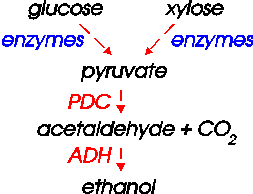
Students also need to understand the relationships between the gene, or DNA for a particular enzyme and the enzyme product. That is they need to understand the structure of DNA, the way DNA is transcribed to give mRNA, and the way mRNA is translated at the ribosomes to give the protein product of the gene. In the case of our work, we needed to find two genes, one for each of the enzymes we wanted to put in the E.coli.
Students also need to know a little about the biology of viruses, especially phages, as these are the vectors we use to insert the genes into the E.coli.
The first step was to isolate the enzymes (proteins) from the Zymomonas mobilis organism. This involved methods for separating the many proteins present, and detecting which of them was the enzyme we wanted. Then we raised antibodies to them, which enabled us to probe a recombinant library made from Zymomonas DNA.
Interviewer: I now need to know something of the techniques used in your research. Can you tell me what techniques are important, and why they are important?
Prof Scopes: A flow chart is a good way to start here.
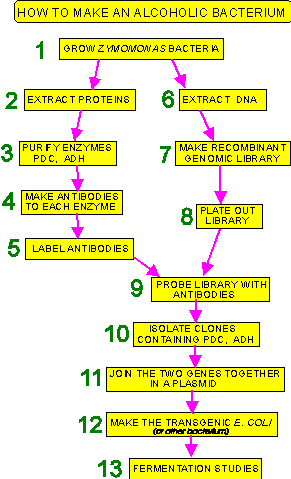
The Zymomonas cells are grown in a fermenter. When we have enough of them they are collected by centrifugation.
Reagents are added to dissolve away the cell walls so that we can extract the proteins from the cells.
Using specialised biochemical methods of protein purification, we isolate and purify each of the enzymes pyruvate decarboxylase (PDC) and acetaldehyde dehydrogenase (ADH). These enzymes are prepared separately.
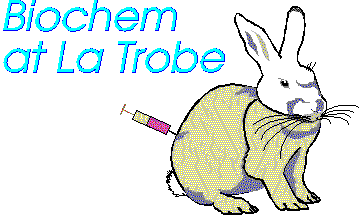
We used to treat these antibodies with radioactive iodine to make them easier to detect later, when we use them. Now a safer method is used to do the same thing.
We also use the Zymomonas bacteria to isolate the genes for the enzymes we want.
To get the genes, we extract the DNA from the Zymomonas, then use this DNA to make a recombinant genomic library. The next diagram shows how this is done:
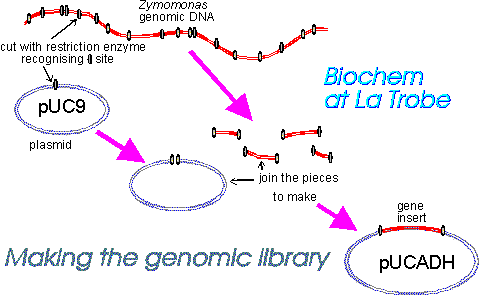
Each E.coli clone contains a different DNA fragment. What we need to do is find the small number of E.coli that are making the enzymes we want. This is where the labelled antibodies we have made are used:
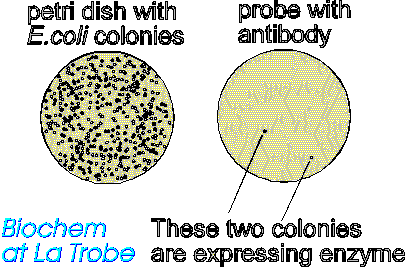
The last step is to put these transgenic bacteria to work and see if they do now produce ethanol from glucose and xylose. If they do, it's on to larger trials.
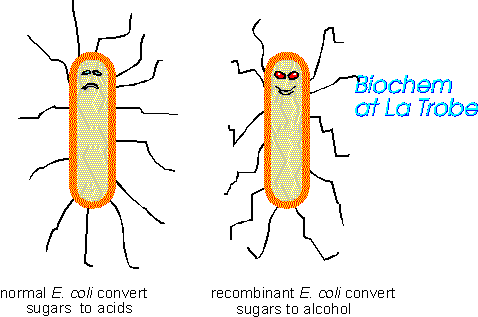
Interviewer: What do you see as the major biological implications of the work you are doing? For example; Are genotypes or phenotypes being altered?, Is a species survival potential increased?, Will someone or something have a better quality of life?
Prof Scopes: The E.coli certainly have both their genotypes and phenotypes altered. That is the whole aim of the work.
But the most important consequences are those that effect humans and indeed the entire community of life on Earth. Fossil fuel use is causing severe damage to out planet. If we can gradually move to non-polluting, sustainable or renewable energy sources, including ethanol for fuel, the problems we face with the greenhouse effect and the disposal of biological waste will all be reduced. The implications of that for quality and possibly length of life, including human life, are very encouraging.
Interviewer: There is often discussion or debate about issues associated with biotechnology. What is one such issue relating to your work? Can you outline the arguments of the opposing sides of the debate please?
Prof Scopes: A biotechnology must be economically viable to succeed. As well as the science, there are considerations of laws, ethics, politics. This means that the end result is usually an economic balance between alternatives.
The issue of patenting of 'inventions' such as transgenic E.coli is often debated. Such debates revolve around the rights of the patent holders, usually large companies who have spent millions of dollars developing the 'invention', versus the rights of the people who benefit in society.
Very often the people who would most benefit from the technology, or their governments, cannot afford the prices the patent holders want them to pay. This is where governments and non-government organisation such as the United Nations need to balance up all the arguments and make decisions.
Interviewer: Can you suggest some reading material relevant to anything we have discussed about your work, its implications and issues associated with it?
Prof Scopes: I have prepared a short introduction to this research, students might find that helpful. (Interviewer: Click here to read Prof Scopes interesting introduction.)
Interviewer: Thank you for your time.
![]() Back to the top of this page
Back to the top of this page
For ideas on where you might find additional resource material, look again at the section Resources on another page at this site. And don't forget the power of the Internet to provide you with information. A well thought out search, using a search engine such as Alta Vista, should provide more information than you can possibly use. Try key words such as "renewable energy", "biofuels", "biomass", "lignocellulose" and "ethanol production".
Please do not phone Prof Scopes for further information for your CAT. He, like the rest of the staff in Biochemistry, is a busy person. However, if you think we can help you some more, use either the comment form or the email address for this site and we will do what we can.
If you would like to read another interview with a La Trobe Biochemistry scientist, you can click here to go back to the Interview Index.
If you would like to 'netsurf' for some more resources, you might find the author's favourite Biology Bookmarks helpful.